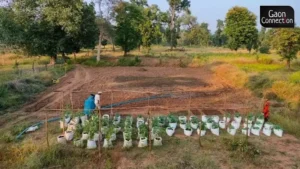Sachin Kothari started on his career trajectory like thousands of others like him. He graduated with a Bachelor of Commerce (B. Com) degree, enrolled for an MBA course and worked in a corporate office for four years.
But soon he decided to quit his corporate career and start a plant nursery that has not just given him what he was looking for – a stress free job – but also a comfortable annual income, besides an opportunity to provide employment to nearly 10 others.
“It was a comfortable enough life but a stressful one, and I decided I should work on something that gave me peace of mind and happiness instead,” Sachin Kothari, who has a nursery in Sarkhet village in Dehradun district, Uttarakhand, told Gaon Connection.
Also Read: A portal with registered nurseries from across India. Go ahead and order your favourite sapling!
At the moment, the 39-year-old’s nursery is getting ready for the approaching winters. In his polyhouse, petunias, dahlias and marigolds are blooming along with vegetables such as cauliflower, broccoli and capsicums.
The plants from Kothari’s nursery travel far and wide. “We are in a mountainous terrain, and many places from the plains take our plants. Apart from Dehradun, our plants go to Saharanpur, Delhi, Chandigarh, Amritsar, etc.,” the entrepreneur said.
Using cocopeat to grow flowers and vegetables
The saplings at Kothari’s nursery are grown on trays with cocopeat (natural fiber made out of coconut husks) as the growing medium. “It is more expensive than growing in soil, but the advantage is that it is easier to pack and transport,” Kothari said.
Also Read: Nursery times: A blooming business opportunity in Uttar Pradesh
The vegetables and flowers are strictly seasonal, said Kothari. He cultivates them in a polyhouse in a controlled environment and as a result, his nursery is busy all year through, and his produce is ready well in time, ahead of other nurseries. “The polyhouse protects the saplings from the vagaries of weather,” he explained.
It cost Kothari about Rs 30 lakh (Rs 3 million) to set up his polyhouse, he said. “Now, in a year I manage to sell about fifteen to twenty lakh rupees worth of plants and make a profit of about six to seven lakhs, annually,” he said.
Also Read: From pinstripes to growing coffee bean
“The seeds for the saplings come from Delhi where our supplier imports them from other countries,” he said. This is expensive, he admitted, but pointed out that the better the quality of seeds the better the produce.
According to Kothari, the demand for vegetable seedlings went up during the pandemic, though the demand for flowers suffered. “Many people wanted to grow tomatoes, chillies, capsicum, bottle gourd, etc., at home,” he added.
Read the story in Hindi

















